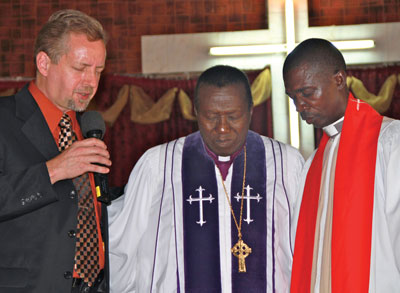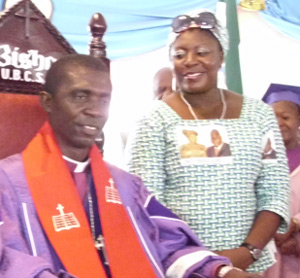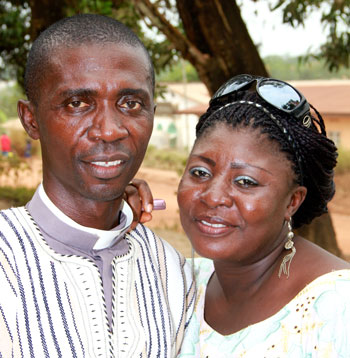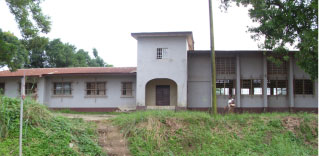07 Feb John Pessima, Sierra Leone’s New Bishop
Steve Dennie, Communications Director
On January 16, 2011, John Momoh Pessima was consecrated as the new bishop of Sierra Leone Conference. The service was held at the Au Memorial church in Kissy, a neighborhood on the east end of Freetown. Rev. Pessima grew up in that church and had been its pastor.

At the installation of John Pessima as bishop. L-r: Jeff Bleijerveld, Director of Global Ministries; outgoing bishop Billy Simbo, John Pessima.
The Council of Ordained Elders, which consists of all United Brethren ordained ministers in Sierra Leone Conference, recommended Rev. Pessima to become the new bishop. Their recommendation was referred to the National Conference meeting in December 2010, where it was unanimously approved.
Bishop Pessima succeeded Billy Simbo, who served three years in Sierra Leone in a transitional role under the umbrella of Global Ministries.
Bishop Pessima came to the United States in October 2011 to meet with the Global Ministries Leadership Team. During that time, he sat down with me for an interview.
Growing Up with Rev. Ali and the Kissy Church
John Pessima was born and raised in Freetown. His mother and father were both Christians. However, it was a polygamous home. John’s mother, the oldest of four wives, gave birth to 12 children. Only three of those children are still alive. Of those three, John is the youngest, and the only son.
John grew up in the Kissy United Brethren church. The pastor was Rev. Henry Ali, who in 1985 became the first General Superintendent of Sierra Leone Conference—the first Sierra Leonean, as opposed to a missionary, to oversee all of the United Brethren work in that country. Interestingly, Rev. Ali was blind. Yet he was a highly respected leader in the Sierra Leone church.
“Rev. Ali discipled me,” says Bishop Pessima. “He was a very good leader. Some of us young guys looked at his leadership qualities and decided to become pastors. We talked with him, and he encouraged us. Three of us went to college together.”
One of those fellow youth group members was Eric Mustapha, who started the United Brethren church in Berlin, Germany, among the Sierra Leone immigrant community. He is now a superintendent and pastor with the United Methodist Church in London.
The other, Ken Lusani, is a Methodist pastor in Freetown and a lecturer at the Sierra Leone Theological College, which is run by the Anglicans and Methodists.
Spiritual Turning Points
John says, “I became the youth leader at Kissy for some time, and was the music director, because I played guitar and keyboard. I also taught Sunday school and became Sunday school superintendent at Kissy.”

John and Nancy Pessima
“Through my youth activities with Christian Endeavor, I was involved with Bible quizzing. Bible quizzing inspired me to go into the ministry.”
They did Bible quizzing with churches divided into four districts–Mattru, Gbangbaia, Bo, and Western Area (Freetown). Then they would come together as a national church, with the best quizzers from the different districts.
“For several years I was the best quizzer in the Western district, so I thought I could be a good Bible scholar if I went to college.”
Though John grew up in the church, he says he came to know the Lord in 1984 at a youth camp in Mattru.
“One presenter, Albert, sang the song ‘The King is Coming.’ I went to him afterwards and asked him to write out the words for me. I meditated on the words of that song, and on Sunday, after the sermon, I went before the altar and surrendered myself for prayer. I decided immediately that I wanted to become a pastor.”
Upon returning to Kissy, John became more active than ever before. He also reported to the church board and Rev. Ali his desire to become a pastor. The church decided to give him a year, to make sure he was serious and that this wasn’t an impulsive desire. He began a kind of internship with Rev. Ali, from the end of 1984 to the beginning of 1986.
“Rev. Ali counseled me, gave me assignments, and examined my work during that time,” John recalls. “Then I went to Bible school.”
In 1986, John entered Sierra Leone Bible College in Jui, outside of Freetown. This is the college which the United Brethren church jointly sponsored with several other denominations. He graduated in 1989 with a diploma in Theology, and returned to work at Kissy. In 1991, he was ordained in Bo by Bishop Jerry Datema.
John eventually returned to Jui in 2005 to complete his bachelor’s degree. He then entered Fourah Bay College in Freetown, receiving a Master’s of Philosophy in Theology in 2010.
Living Amidst the Civil War
Of course, between his stints at Jui, the country endured a terrible civil war throughout the 1990s. When the war started, John was the pastor of Kissy.

John and Nancy Pessima
“It was terrible. We lived at the parsonage in Kissy when the rebels came. My wife, Nancy, and I had three children—two of our own, and one adopted; our youngest child was not yet born. I had a pickup van. I took my family to a point at Kissy Road to hide them, leaving the vehicle at a distance. When I returned, I was apprehended by rebels, who made me drive them to a place close to the national prisons. I then ran away from the vehicle.
“I was now in the western part of Freetown, while my family was in the east. We were separated for three weeks. My mother, who was old, had to remain at the parsonage. During those three weeks, rebels burned down the parsonage; the empty space is still there. My mother got out okay.
“Most of the church members scattered. Some went up country, others went to Guinea. Our board chairman had his left hand amputated by the rebels.
“As it turned out, the place where I had left my family was not safe. They moved from place to place. I finally came in touch with my family, but we had no place to live, since the parsonage was gone. Instead, we moved into the United Brethren mission house, which was in a part of the city the rebels hadn’t reached. We lived there for some time, until we were given a place to stay.”
Though thousands of people fled from Freetown, the Pessima family stayed throughout the entire conflict. Most of the church people, he says, have now returned.
Nigerian peacekeeping troops were in Sierra Leone through much of the rebel war. “They killed a lot of innocent people, because when they saw some of us Sierra Leoneans, they would think we were rebels.”
Later, British troops arrived and brought a lot of stability to the country. Finally, in 2002, the Sierra Leone president declared that the war was over.
The Church Rebuilds
The Sierra Leone Church began picking up the pieces. Today we have 70 churches in Sierra Leone, plus 15 preaching points, with an estimated membership of 5000 people. The United States is by far the largest national conference, but Sierra Leone is the second-largest, and Honduras is not far behind.
Sierra Leone Conference had functioned to an extent throughout the war years, and a General Superintendent led the conference. But they encountered constitutional problems and leadership deficiencies.
Eventually, the conference asked the Global Ministries Leadership Team to send Billy Simbo, a native Sierra Leonean who had immigrated to the United States several decades before, to provide temporary leadership to the conference and help them restructure. He arrived in April 2007. John Pessima worked with Billy Simbo in various ways, including revising the constitution.
They no longer have elections for their top leader. Instead, the ordained ministers meet and choose a leader, whose name is then taken to the annual conference for ratification.
Bishop Pessima says, “There was a need to call our leader a bishop, as some of the other national conferences do. So in 2008 we gave Billy Simbo the title ‘Bishop.’ Even though Billy was a missionary, he’s a Sierra Leonean. I then became the first national bishop of the conference in 2011.”
What did Billy Simbo do right?
“One thing he did right was to restructure the entire conference. Reviewing and revising the constitution was another. In addition, he mentored the present leadership.” Which included John.
“There are several things I gained from him. He was very firm in his decisions. I learned that from him. The other thing is that he liked to groom others. There was no difference between him and the other pastors. We all lived and worked together as one. He never created any distinctions between himself and others.”
The Bishop’s Leadership Team
The conference worked out the following mission statement:
“The United Brethren in Christ exists to serve God on biblical principles through the proclamation of the Gospel and the provision of social services to mankind.”

The four superintendents. L-r: Sorie Kamanda (Pastoral Development and Church Renewal), Peter Kainwo (Evangelism and Church Planting), Justin Marva (Administration and Finance), Emmanuel Farma (Church Services).
Working with John are four superintendents. One of the changes brought under Billy Simbo’s leadership was to appoint superintendents by function, rather than according to geographical district. Bishop Pessima recommended the four superintendents for approval.
Rev. Sorie B. Kamanda is the Superintendent of Pastoral Development and Church Renewal, a position John held for two years. He is in charge of the pastors and their welfare. He chairs the board of ministerial relations, and is in charge of discipline when problems occur with pastors. “He’s an older person who has been in the church for some time, so the pastors have respect for him,” John says.
Rev. Peter Kainwo, the son of a retired minister, is the Superintendent of Evangelism and Church Planting. He uses the Jesus film and other strategies to reach out to people.
Rev. Emmanuel Farma, the Superintendent of Church Services, is in charge of various groups—the youth, men, women, young adult.
The Superintendent of Administration and Finance is Justin Marva.

The four district leaders: SAO Kamanda ((north), Peter Kainwo (south), Elizabeth Sowa (west), Rev. Ansuma (east).
In addition to the superintendents, they have regional leaders in each of the four regions. John chose these leaders, and regularly visits them to see what they are doing.
Priorities for Sierra Leone Conference
As bishop, John has set some priorities.
One priorities is to rehabilitate the physical structures of churches, parsonages, and schools.
“We are encouraging the local churches to do that by themselves for now. If they later ask for assistance, they can show what they are doing.”
The new Bo church is completed and will be dedicated in December. They have now torn down the Kissy church and are looking for people to help construct a new church there. They usually build around the existing structure. Then, when the roof is up, they tear down the old structure which is now inside the new one.
Another priority, John says, is mobility to supervise the work. In Sierra Leone, the United Brethren church is located mostly in the south and interior areas. It is very difficult to reach some of these villages. “If I want superintendents to go there to supervise the work, I need to provide them with Honda motorcycles, like the XL125. We have parts for that motorcycle in the country, and they are easy to maintain.”

The Secretariat building in Bo
Another priority is centralizing the administration in Bo.
Right now, John and Sorie Kamanda work out of Freetown, while the other superintendents work out of Bo. Nearly every week, John travels to Bo, which is 150 miles over poor roads.
They need to centralize the administration in Bo, where the conference office—called the Secretariat—is located. Bishop Pessima has set this as a priority. However, the Secretariat was severely damaged during the war and hasn’t been repaired. There is no equipment, tables, chairs, or roof. When they restore the building, they can function there as a national office.
Another priority is evangelism and church planting.
“During the war, most of the peacekeepers were from Muslim countries like Pakistan, Jordan, and Syria. Wherever they went, they planted mosques. Some of these were sponsored by Ghaddafi, who poured a lot of money into the country and built a big mosque in Freetown on the highway to the provinces. This has created some difficulty for the overall Church in Sierra Leone—not just for United Brethren. We are moving into areas that are mostly Muslim, like Pujehun, which is close to the Liberian border. We want to use that as a springboard into Liberia.”
Liberia?
Yes, Liberia. The same country which helped spawn the civil war.
“United Brethren came to Sierra Leone in 1855. In all that time, there has been no movement to evangelize other countries in Africa. We want to start in Liberia. We have a lot of Mende people in Liberia, and there are United Brethren people there, too. We have somebody on hand that we want to send as our missionary to Liberia, but he can’t just leave his family and go. It will take some time. We are looking for assistance.”
Bright Spots
Mattru Hospital is another of John’s major responsibilities, since he is chairman of the Medical Board.
“The hospital is still dilapidated and needs to be rehabilitated. We don’t have a medical doctor there now, because we don’t have money to pay a doctor. Our only doctor is a government doctor who is in Freetown most of the time. We also face difficulties paying the staff and doing other things.”
On a very positive note, they have a nursing school in Mattru with about 400 students. The students currently live in homes in town. They are seeking funding to build a dormitory for them.
The schools are another bright spot. The conference also operates 44 primary schools through its local churches, plus five secondary (high) schools—Centennial, Bumpe, Bo, Minnie Mull in Bonthe, and Kenema. The school in Kenema is new during the past 3-4 years.
Most of the teachers receive government assistance, and most of the pastors teach in the schools and serve as chaplains. When John was pastor at Kissy, he also taught in the church’s school.
John mentioned several things that please him.
“I’m getting cooperation from all of the pastors. We are working together as a team. We haven’t had any problems yet.
“I am also pleased by the assistance we are getting from Global Ministries. They are helping us in various areas. They are assisting us in administration and at Mattru. Quite recently, they sent us money to get a generator for the hospital.
“And I am pleased with the way local churches are rehabilitating their buildings on their own. We haven’t received funds from outside to do this. I go around telling our churches, ‘We must strengthen what we have.’”

No Comments